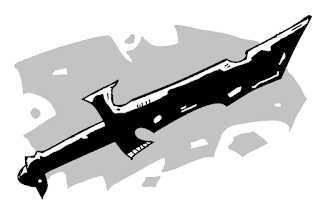Each specific situation will only require one check. When casting a spell, you will not check to complete the spell and have the foe check to resist it; either you will be required to attempt a check to cast the spell, or the foe will be required to attempt a check to resist it. With an attack, you attempt a check to strike the foe; then, if successful, you deal damage based on the weapon or attack type. The foe then attempts a check to neutralize some or all of the damage from that attack.
I then realized that combat breaks this fundamental rule. You roll for damage on a successful attack, and the foe checks armor to soak some or all of that damage.
And then my mind exploded.
What if you don't roll damage? I realized that the very concept of rolling damage is hard-wired in me from 40 years of gaming. You HAVE to roll for damage, don't you?
But the reality is that this game, because it only uses two dice, makes weapon damage pretty generic. A rapier, a dagger, and a short sword all deal 1d6 damage. A light crossbow, a longbow, and a sling all deal 1d6 damage. It's the only die I have (other than the d12 of course), so it's the only damage option really.
But one of the things actual play has revealed is that you are often dealing 1 point of damage; and then armor doesn't matter (unless you roll a 12 and neutralize it all). A 1 in half rounds up to 1. Armor actually doesn't matter 1/6 of the time.
Hmf.
But, if we go with fixed damage, we open up a lot of possibilities. There can be gradations in weapons. There can be a whole slew of differences. you deal half damage (round up) if the foe makes its armor check; you deal double damage if you roll a natural 12; if you roll a natural 12 but the foe makes its armor check, you deal your weapon's typical damage. No rolls are involved. You still have 'variable' damage, but there are only four options within the variables: no damage (full armor soak), half damage (successful armor check or natural 12 attack with opposing natural 12 armor check), standard damage (failed armor check or natural 12 with successful armor check) and double damage (natural 12 attack with failed armor check).
Now, you can go shopping for different weapons. For example:
A dagger, club, or common blade deals 2 points (5 gp)
A short sword, mace, or hand axe deals 3 points (10 gp)
A longsword, keen axe, or hammer deals 4 points (25 gp)
A high-quality non-magical weapon deals 5 points (50 gp)
A masterwork non-magical weapon deals 6 points (100 gp)
However, a keen-edged longsword with an enchantment might deal 6 damage, 7 vs. serpents. This is a pretty powerful weapon, but it's still within the old number scale of 1d6, it just always deals damage at the top end of that range. The dagger is always dealing damage at the lowest end of the range.
Heavy weapons have the exact same scale, but you get to add your might rating to damage.
A battle axe deals might +2 damage (15 gp).
A war axe deals might +3 damage (30 gp).
A great axe deals might +4 damage (50 gp).
Better quality weapons deal +5 (100 gp) and +6 (200 gp)
A sling or short bow deals 2 damage (10 gp)
A heavy sling or hunter's bow deals 3 damage (20 gp)
A heavy bow or crossbow deals 4 damage (35 gp)
Better quality weapons deal 5 damage (75 gp) or 6 damage (150 gp)
None of these breaks the game, but they give characters room to grow for the first level or 2 without introducing magical weapons.
I could actually list all three damage options every time, but I don't know if it's really needed. The numbers are small enough; most people can do the mental math that half of 7 rounded up is 4, and double 7 is 14; I don't need to notate 7 damage as (4/7/14).
I also like the variety this creates for monsters; a goblin deals 2 damage, while a hobgoblin deals 3, a gnoll deals 4, a bugbear deals 5... they all deal 1d6 damage, but it's scaled to the monster and allows for a cleaner progression. You also never end up with a dragon's bite dealing 2 points because he rolled poorly or a goblin suddenly one-shotting a character because he got critical damage and rolled 6 on both of his 1d6 rolls. The dragon's bite that deals 12 will deal at least 6 (unless you totally soak it), and the goblin's blade will never deal more than 4 points, even if he crits.
This will also have a carry-over effect for spells (both damage and healing), which I also like. Nothing sucks more than casting that big fireball or healing spell and rolling a bunch of 1s; oh, look, my fireball did 8 points of damage, and you soaked half of that, so take 4 points of damage from the best spell I have.
Monsters with a susceptibility to damage can also then scale better. A fire-using creature might suffer +1 from cold magic; so if the ice magic deals '3 points per mana', and you invest 4 mana, that spell deals 12 damage vs. most foes, but 16 points vs. fire-using foes.


No comments:
Post a Comment